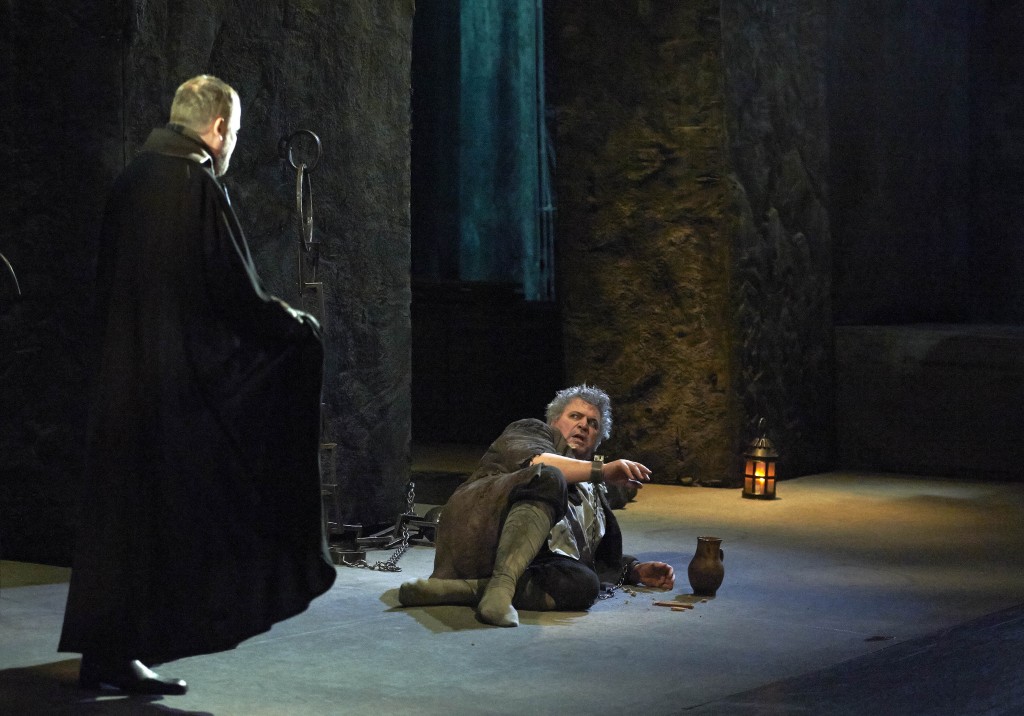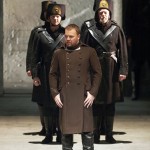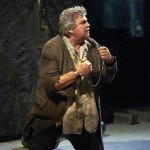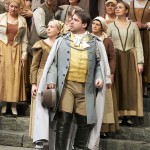 In the plot of Beethoven’s Fidelio, Don Pizzaro, governor of a state jail, holds Florestan secretly imprisoned on political grounds. Sounds familiar? Redolent of political oppression from time immemorial? Never more so than in the 21st century. So why must it be located historically, in the early 19th century? Otto Schenk’s traditional production for Vienna State Opera has bare mud-grey walls, is sparsely furnished for head jailor Rocco’s house. Florestan’s wife Leonore has disguised herself as a man named Fidelio, hoping as the jailor’s assistant to reach Florestan. But Rocco’s daughter Marzelline- rejecting Jaquino’s attempts to woo her in the first scene- has fallen in love with Fidelio. (The gender implications, one of ‘the strange history of transvestite heroines’, are another matter.) This over-complicated plot is testing -except for seasoned opera fans. The dull staging doesn’t help, but it’s Beethoven, his only opera, so there are musical compensations!
In the plot of Beethoven’s Fidelio, Don Pizzaro, governor of a state jail, holds Florestan secretly imprisoned on political grounds. Sounds familiar? Redolent of political oppression from time immemorial? Never more so than in the 21st century. So why must it be located historically, in the early 19th century? Otto Schenk’s traditional production for Vienna State Opera has bare mud-grey walls, is sparsely furnished for head jailor Rocco’s house. Florestan’s wife Leonore has disguised herself as a man named Fidelio, hoping as the jailor’s assistant to reach Florestan. But Rocco’s daughter Marzelline- rejecting Jaquino’s attempts to woo her in the first scene- has fallen in love with Fidelio. (The gender implications, one of ‘the strange history of transvestite heroines’, are another matter.) This over-complicated plot is testing -except for seasoned opera fans. The dull staging doesn’t help, but it’s Beethoven, his only opera, so there are musical compensations!
Marzelline, Rocco’s daughter, is beautifully sung by a blonde Ildiko Raimondi. Beaming with love, in her first aria, Kommt Fidelio im Haus alles verändert, she sings how Fidelio has changed everything. Matti Salminen, seasoned Finnish bass is impressive as the approving father. Fidelio (soprano Ricarda Merbeth, former member of Vienna State Opera ensemble) sings of her mission, ‘Wie gross die Gefahr, wie schwach die Hoffnung’ , however great the danger, however feint the hope . As Fidelio /Leonore Merbeth, with straight black hair, seems a little fulsome. (A frockcoat doesn’t disguise the bust.) The trio gloriously affirm the Power of Love.
Rocco tells of the prisoner whose meagre rations have been reduced. Florestan has no light, no straw , nothing. 
The Minister Don Fernando has heard of Pizzaro’s abuse of power. Pizzaro’s solution is now to murder Florestan. But first jailor Rocco must dig a grave in Florestan’s cell. A trumpet call will warn Pizzaro of the arrival of Don Fernando. Pizzaro (Tomasz Konieczny) enters, delivers his aria , Der Sieg ist mein (the victory is mine.) Konieczny is slim, hirsute, blonde, cropped beard: with modish close-fitting coat, scarf, and boots, much too attractive for the villain of the piece! The voice, a dramatic bass-baritone, is formidably authorative, however.
Merbeth in Fidelio’s aria Komm Hoffnung. Die Liebe wird’s erreichen (Love will reach it!) is a high point. Observing Pizzaro’s rage, more determined to succeed, she will penetrate the hidden place where her enchained lover is hidden. Her faith in love and freedom drives her on; her inner compulsion will not falter.
An incredible moment when the prisoners emerge, from the sides of the stage into the light -as if blinded. ‘Oh what joy to breathe in the open air. Their life as prisoners is a tomb. Oh, heavenly rescue! But their happiness –Was ein Gluck!‘- is counterpointed by other voices, knowing they are being watched and listened to. ‘Wir sind belauscht.’ We see guards patrolling on the stage’s overhead bridge. (Another resonnance for 21st century audiences, surely.)
Florestan has so far not been seen: that man who Rocco has been ordered to give less and less to eat. In Act 2, Florestan’s cell, we see Florestan (Peter Seiffert) kept like an animal on a chain- at first lying flat on the ground. ‘Gott! welch’ Dunkel hier!’, sings Peter Seiffert, a great Wagner helden tenor –Tanhauser, Tristan recently in Vienna- and an actor tremendous to watch.  ‘What a test! But God’s will is just. The measure of suffering is up to him.’ And, poignantly, the springtime of life’s happiness has deserted him. He dared to speak the truth. Chains are his reward. But his consolation is his duty is done. (Meine Pflicht ist getan.)
‘What a test! But God’s will is just. The measure of suffering is up to him.’ And, poignantly, the springtime of life’s happiness has deserted him. He dared to speak the truth. Chains are his reward. But his consolation is his duty is done. (Meine Pflicht ist getan.)
But now he feels a gentle breeze…he senses his wife Leonore (Fidelio) will lead him to freedom. Seiffert seems to collapse. He lies again flat, prostrate. (No clapping. No time to applaud.)
Fidelio sings she will loosen his chains, bring him freedom, whoever you are. Florestan wakens. ‘Mercy, give me one drop of water’, Seiffert such a great actor. Fidelio offers him wine and bread – the bread she’s been saving for Florestan – although she can’t quite recognise his features. Florestan can’t repay ‘his’ good dead. He’s moved seeing the young man there, not realising who it is. ‘ It will be all over for him in a day or so.’ In Beethoven’s great trio -Florestan , Rocco, and Fidelio- each sing their separate lines in contrapunct. Florestan, repeats ‘O dass ich eux nicht lohnen kann ‘, if only I could repay you ; Fidelio and Rocco, ‘It’s more than I can bear’, ‘his life will soon be at an end.’
Pizzaro enters, gloats over his victim’s powerlessness. As Pizzaro is about to stab Florestan, Fidelio intervenes against his Mörderlust (bloodthirst)- steps between them. ‘First kill his wife!’ Fidelio draws a pistol, and reveals his identity. ‘What pluck! Shall he, Pizzaro, tremble before a woman?’
Now the trumpet call, signalling the arrival Minister Don Fernando, Beethoven’s trumpet surely one of the iconic moments in all music, sending a call to freedom, an end to tyranny. Du bist gerettet, saved by almighty God. ‘The hour of vengeance strikes. Love in league with courage will save you!’
O, namenlose Freude! After this suffering, this is beyond joy! (There are strains of Beethoven’s Ode to Joy movement.) Alone Leonore and Florestan thank God for their deliverance. The duet between Florestan and Leonore is marvelously sung and played, Seiffert and Merbeth reminding one of great theatrical reunions (King Lear and Cordelia?). ‘To hold her husband to her breast’, sings Merbeth poignantly.
There follows a long orchestral interlude, the most sublime of Beethoven’s orchestral overtures, Leonore (no. 3). But – blasphemy- isn’t this excessively long, so as to interrupt the dramatic momentum on stage? This is an opera. (The supremacy of libretto over music was argued by Gluck in his 1760s manifesto.) Or is Beethoven having the last word in the debate, proclaiming music over text? The audience applauded as if it were the end of the opera, a triumph for conductor and music director Franz-Welser Möst and his Vienna State Opera Orchestra.
Notwithstanding, the stage opened out- now brilliantly lit from the screen at the back- is flooded by the wives coupling with their male prisoners. Heil sei den Tag, the day long yearned for!  Don Fernando (bass-baritone Boaz Daniel) sings, representing the best of Kings: their enlightened ruler, grants a general amnesty: ‘A brother seeks his brother and will help whom he hears.’ Fernando recognises the prisoner kneeling as his friend Florestan. (Fingers point at Pizzaro demanding his punishment.) It is only appropriate that Fidelio, now Leonore, should release his chains, set him free.
Don Fernando (bass-baritone Boaz Daniel) sings, representing the best of Kings: their enlightened ruler, grants a general amnesty: ‘A brother seeks his brother and will help whom he hears.’ Fernando recognises the prisoner kneeling as his friend Florestan. (Fingers point at Pizzaro demanding his punishment.) It is only appropriate that Fidelio, now Leonore, should release his chains, set him free.
Oh Gott, welch ein Augenblick, what a moment. Inexplicably, you try us but never desert us. It says something of Beethoven’s optimism and faith in mankind that the opera should end on a positive note. Not tragically, or in dramatic ambiguity. The knife of Pizzaro was staived.
Retten des Gattanten; the married couple are saved. Seiffert, overcome with joy, bemused, blinking in the daylight, the glow of happiness. He shakes his head in astonishment.They, Seiffert and Merbeth , passionately embracing, look like young lovers experiencing love for the first time. Led by Florestan, the Chorus of released prisoners and the people join in a hymn of praise to the noble woman who saved her husband.
The Fidelio narrative is too relevant to be historicised . (‘Amnesty’ cheekily handed out flyers superimposing over the Fidelio program cover an appeal to free political prisoners.) Vienna State Opera’s classic (Schenk) stage design still appeals, but I’d like to see Fidelio updated, cutting-edge, to the 20th/21st century. P.R. 30.12.2013
Photos: Tomasz Konieczny (Don Pizzaro); Peter Seiffert (Florestan); Tomasz Konieczny (Don Pizzaro) ; Peter Seiffert (Florestan) ; Boaz Daniel (Don Fernando)
Featured Image: Ildiko Raimondi (Marzelline); Matti Salminen (Rocco); Ricarda Merbeth (Fidelio/Leonore)
(c) Wiener Staatsoper /Michael Poehn
viennaoperareview.com
Vienna's English opera blog
